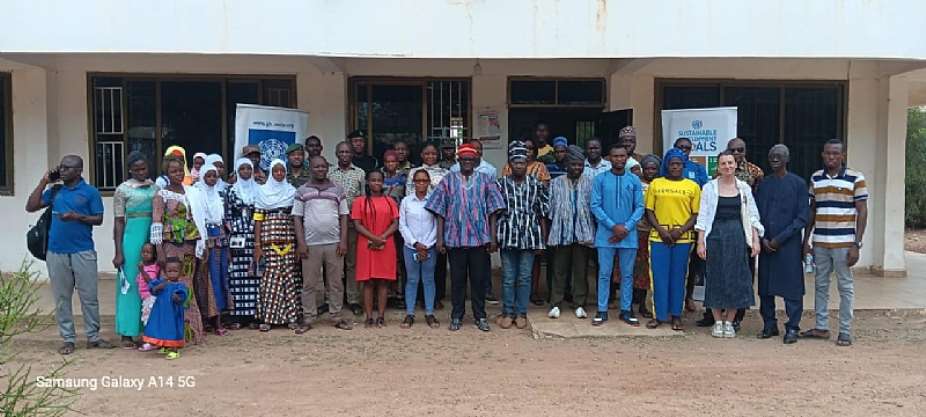Madam Melody Azinim, the United Nations Development Programme (UNDP) Project Coordinator, has dispelled the notion that violent extremism is only an external phenomenon.
According to her, violent extremism could also be homegrown if governments fail to deliver the social contract between them and their citizens.
Madam Melody was speaking at the opening of a two-day training programme held in Tumu in the Sissala East Municipality of the Upper West Region.
The two-day programme is under the auspices of the Atlantic Corridor Project, themed “Promoting Civilian-Security Engagement for Collaboration for Early Warning to Prevent Conflicts and Violent Extremism in the Upper West Region.”
It is being sponsored by the United Nations Development Programme (UNDP) and the Norwegian Ministry of Foreign Affairs, with implementation by the National Peace Council.
Other vulnerabilities likely to trigger extremism, according to the Atlantic Corridor Project Coordinator, included tribes feeling superior to other tribes, political divisions, religious intolerance, and the non-availability of economic opportunities, among others.
She stressed the need to empower women through the creation of economic opportunities, noting that “if you leave out women in the development agenda, somebody will take advantage and recruit them for the wrong purposes.”.
“Let’s be more involved in the peace and security of our communities and nation at large; peace and security are all of our responsibility, and no one should sit and say it is the responsibility of one person," Madam Melody said.
She said collaboration between civilians and security would ensure immediate reporting of early warning signals, hence the essence of the training.
She stressed the need to build trust between the two because civilians often think that security personnel will not protect them when they provide early warning information to them whilst there were other concerns from the security side that community members sometimes provide false information, hence the need to build trust and capacity among both for effective collaboration.
Professor Samuel Marfo, a Prof. of Peace and Conflict Resolution at the Simon Diedong Dombo University of Business and Integrated Development Studies (SDD-UBIDS), noted that security is a critical component of any democratic governance, adding that community security works well when there is a shared responsibility.
Mr. Emmanuel Danyomah, the Executive Secretary of the Upper West Regional Peace Council, thanked UNDP and the Norwegian Ministry of Foreign Affairs for funding the project.
Mr. Limann Ahlhassan, the Sissala East Municipal Coordinating Director, noted in a speech read on his behalf that the Assembly has been collaborating with various organisations to ensure peace in the district.
He said security personnel in the district were doing their best, but because of inadequate numbers, they needed the support of community members. He appealed to them to always endeavour to report early warning signs to the security people for urgent actions.
Pio Kwabalugu Badiyiga Ali IV, the Chief of Kapun, described the civilian-security relations training as timely as he recently observed an increase in the influx of people from Burkina Faso into their community, saying this called for increased vigilance on their part.
The Chief reiterated the need to economically empower women to reduce their risk of vulnerability.







 4,300 Liberians at Buduburam Refugee Camp to return home
4,300 Liberians at Buduburam Refugee Camp to return home
 Two dead in premix fuel depot explosion at Essikado-Ketan
Two dead in premix fuel depot explosion at Essikado-Ketan
 Driver of President Akufo-Addo convoy SUV dies in road crash
Driver of President Akufo-Addo convoy SUV dies in road crash
 Akufo-Addo's convoy in fatal crash
Akufo-Addo's convoy in fatal crash
 Mepe flood victims still in tents 8months after Akosombo Dam spillage
Mepe flood victims still in tents 8months after Akosombo Dam spillage
 Kpemka’s appointment as Deputy BOST MD is unconstitutional – Kwabena Donkor
Kpemka’s appointment as Deputy BOST MD is unconstitutional – Kwabena Donkor
 Voter registration: Two Togolese Nationals arrested in Buem for attempting to re...
Voter registration: Two Togolese Nationals arrested in Buem for attempting to re...
 DR Congo thwarts Kinshasa 'coup attempt': army
DR Congo thwarts Kinshasa 'coup attempt': army
 Media has made good progress in Ghana — Frema Opare
Media has made good progress in Ghana — Frema Opare
 Election 2024: NDC pledges to scrap betting tax, targets 80% youth support
Election 2024: NDC pledges to scrap betting tax, targets 80% youth support
